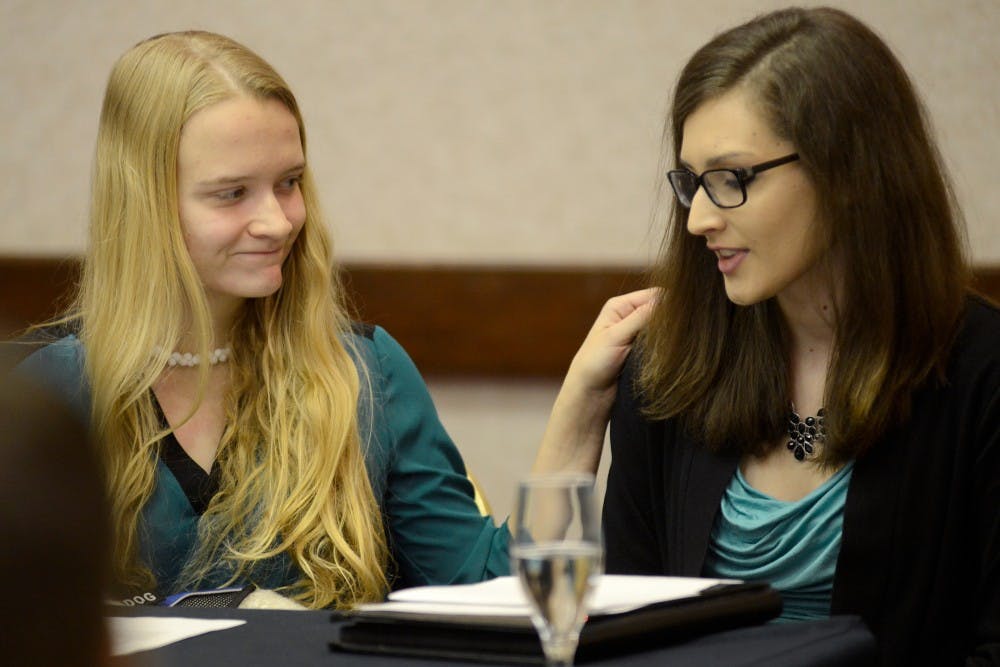Four women, all current MSU students, filed suit in federal court on Wednesday alleging MSU failed to respond timely and effectively against those accused of sexual assault.
Here are six things you need to know about the lawsuit.

Emily Kollaritsch, left, comforts Shayna Gross after Gross made a statement regarding her alleged assault during a press conference on Nov. 18, 2015 at the Marriott in East Lansing. Kollaritsch and Gross were students at MSU when they were allegedly assaulted. Four individuals, including Kollaritsch and Gross, filed a Title IX campus sexual assault civil lawsuit against the Michigan State University, which alleges that MSU failed to adequately investigate complaints of sexual assault.
Four women, all current MSU students, filed suit in federal court on Wednesday alleging MSU failed to respond timely and effectively against those accused of sexual assault.
Here are six things you need to know about the lawsuit.
1. The heart of the lawsuit deals with the length of time it took MSU to investigate the claims of sexual assault, as well as the inadequacy the cases of sexual assault were dealt with.
"The utter lack of immediate and adequate response by MSU officials to these and other complaints of sexual violence experienced by its students is reprehensible," attorney for the plaintiffs Alex Zalkin said in a statement. "Rather than stepping up and doing the right thing morally and under the law, MSU deliberately shirked its legal responsibilities which has served to injure and re-victimize these, and probably many other student-victims of campus sexual assault."
The investigations were typically allowed to go on for well beyond the 60 days maximum allowed by the Office for Civil Rights and the victims reported negligence and the uncooperative nature of MSU administrators in helping relieve the situation. MSU employees are accused of going long periods of time not returning phone calls and emails to investigators and, in the case of Vice President of Student Services Denise Maybank, holding a completely separate investigation after one of the victim's cases was closed, which the suit alleges she had no authority to do.
2. Emily Kollaritsch and Shayna Gross were both allegedly sexually assaulted by the same person.
After taking almost 200 days, according to the lawsuit — 140 days longer than what is acceptable to the Officer for Civil Rights — Kollaritsch received an initial investigation report. Throughout the next several months, she reported to MSU her abuser retaliated against her, claims she said went ignored.
Months before Kollaritsch was finally told MSU would do nothing about the situation, Gross was invited to a fraternity where she was given a drink by the same individual in Kollasritsch's case. She said she had no memory of the night, but was told by the individual they had engaged in sex three separate times. She reported the assault a few days later, facing a similar set of problems with investigators.
3. MSU is not the only party being named in the lawsuit.
The Board of Trustees and their capacity as the board, along with President Lou Anna K. Simon, Vice President for Student Affairs and Services Denise Maybank and MSU's chapter of Kappa Sigma Fraternity are also named as defendants in the suit.
Though the Board of Trustees, Simon and Maybank are being held responsible for failing to adequately monitor the sexual assault program, claiming they showed deliberate indifference, the fraternity is being held liable for different reasons.
The suit alleges the fraternity had a duty to keep Shayna Gross safe when on the premises, a claim which, depending how it might be used in court, is unique, Cooley Law School professor David Tarrien said. Tarrien said there is a relationship between a visitor and the owners of a house, but the claim that the fraternity had an active duty to keep her safe, "is fairly novel," he said.
4. As a result of the sexual assault and its botched handling by MSU, the lawsuit lists the effects on the victims as a means to establish grounds for damages.
Though each case is slightly different, the suit alleges similar emotional and academic results of the assaults, though no exact dollar amount has been listed:
5. These kinds of lawsuits are are far from rare.
The Zalkin Law Firm, representing the plaintiffs, is involved in a similar lawsuit against the University of California, Berkeley, where three students are suing the school for not adequately educating the victims on resources to prevent sexual assault and falsely claiming the university was a safe place.
"There were several cases (at different universities) that have alleged the investigation was negligent," Tarrien said.
He said there are a number of moving parts in the case and the outcome is far from certain, although the fact MSU was already held responsible for Title IX violations from the Office for Civil Rights should help the plaintiffs.
"It's basically going to come down to a question of fact," he said. "The jury or the bench judge who hears the case is going to take into account the evidence, and basically going to determine whether Michigan State's response was reasonable. And if it's not reasonable then they will lose the case."
Support student media! Please consider donating to The State News and help fund the future of journalism.
6. What happens next?
MSU is not allowed to comment on ongoing litigation, though MSU spokesperson Jason Cody said they have 28 days to file a response to the lawsuit, depending on when it was actually filed.
Because the case was filed in federal court through the Western District of Michigan, the actual civil trial would potentially be in Grand Rapids, although Zalkin said no court dates have yet been set.
"As with most court cases this will be a timely process but we're going to work through it and respond accordingly," Cody said.